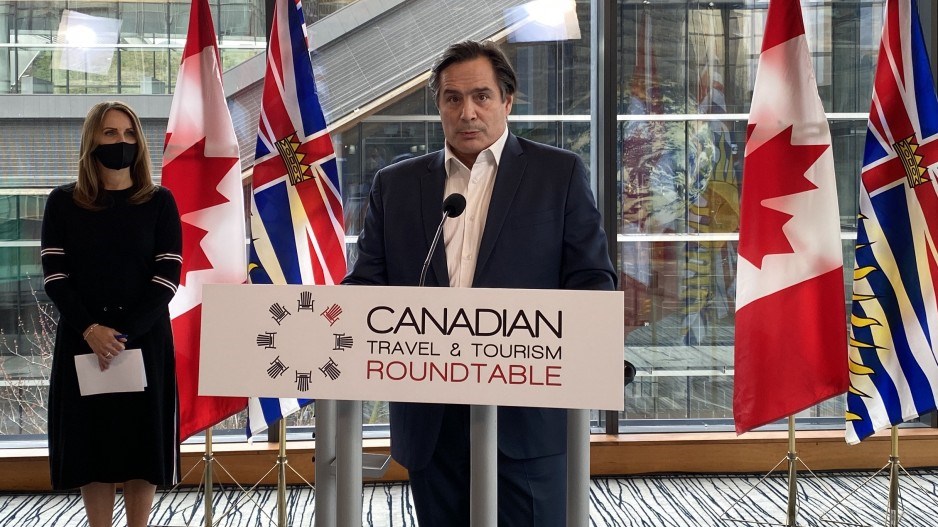Canada should eliminate its requirement that foreign visitors and returning Canadians provide negative antigen COVID-19 tests in order to enter the country, according to tourism sector insiders.
The federal government on Feb. 28 dropped its requirement that all travellers – regardless of vaccination status – provide proof of a negative molecular test, such as a PCR test, taken within 72 hours of their scheduled flight or land entry into Canada.
In its place, however, came a new option if a traveller does not want to provide a PCR test. Travellers are now able to provide a cheaper, and less accurate, antigen test result taken within 24 hours of arrival. What makes that test cumbersome is that it must be administered or observed by staff at a pharmacy, laboratory or health-care facility.
"In requiring pre-departure rapid antigen tests, the government missed an opportunity to align with other international jurisdictions that have removed pre-departure test requirements for fully vaccinated travelers," said Bridgitte Anderson, a member of the Canadian Travel and Tourism Roundtable (CTTR), and CEO of the Greater Vancouver Board of Trade.
Some countries that have done away with pre-flight COVID-19 testing requirements include the U.K., France, Germany, Italy, and Denmark.
The U.S., like Canada, requires visitors to show proof of a negative antigen test in order to enter the country by air. Unlike Canada, the U.S. does not require those tests at land borders. Members of the CTTR said that they would like the U.S. to drop its COVID-19 test requirements for air travellers, and if it does not, Canada should be a leader in dropping its test requirement first.
In what was good news for travel agency operators, Ottawa also recently lifted its travel advisory that Canadians avoid all non-essential travel, and instead now urges Canadians to "practise special precautions."
That changed requirement was for all travel except for cruises, TravelBestBets.com president, and CTTR member Claire Newell told BIV after today's press conference.
"For my business, I've seen a huge decline in bookings," said Newell, who is also a CTTR member. "We are still well below 50 per cent of pre pandemic levels, and I've seen the hesitancy that people have when they're making bookings while testing is still required."
She would like the higher-level travel advisory taken off cruise trips to help stimulate the tourism secor, and she stressed how important the cruise sector is for Vancouver's economy.
"While it might be too late for March Break, it is right now that decisive action needs to be taken by the federal government in order to save the summer season," she said.
Keith Henry, CEO of the Indigenous Tourism Association of Canada and a CTTR member, said Indigenous tourism contributes about $2 billion to Canada's gross domestic product.
"Unlike much of Canada's tourism sector, indigenous tourism has been significantly hit especially hard primarily because a lot of the marketing we did in this country for indigenous tourism was very focused on international markets," he said.
"When March 2020 hit, we saw a complete collapse of so many of our businesses – far greater than what we might have seen across the average that we see in the rest of the tourism sector."
Tourism Industry of Canada CEO Walt Judas is also a CTTR member. He joined Henry, Newell and Anderson at a press conference at the Fairmont Pacifc Rim this morning to add his voice to the chorus urging an end to COVID-19 test requirements for travellers.
"It's time to follow the rest of the world and remove unnecessary testing requirements for fully vaccinated travellers and let the tourism industry get back to work," he said.
CTTR members told BIV that government support programs are still needed. One, which provides a rent subsidies, is set to end on March 31, and if that happens it could prompt some businesses now eking by to close.
"We really need [government support programs] extended till the end of the summer, at the very least," Judas said.
B.C.'s Provincial Health Officer Dr. Bonnie Henry yesterday said that she has been hearing "loud and clear," that people in the province want her to move "slowly" in removing her health orders.
One restriction now in place requires those entering restaurants or entertainment venues to provide proof of vaccination, usually in the form of the BC Vaccine Card. Another requires people to wear masks in indoor public spaces.
Henry said she is reviewing all restrictions to ensure that they stay as long as they are needed.
"I was very heartened to see that Dr. Bonnie Henry is going to review these restrictions in the coming weeks ahead of spring break, and I would urge the government and public health officers to follow the lead of other jurisdictions so that when it comes to Spring Break travel for families, and when it comes to business travel, that we aren't the only jurisdiction that has restrictions in place," said Anderson. •




